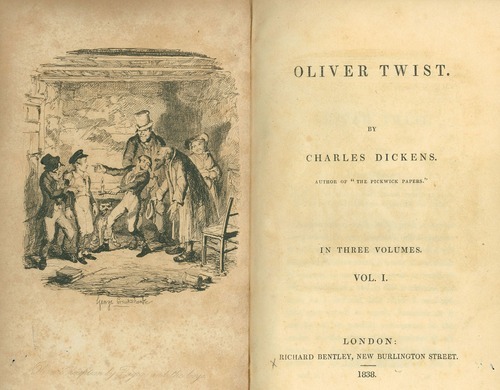
This classic, while it is by far the poorest book by Dickens I have read, nevertheless somehow endures as one of the author’s most visible and popular works. Perhaps if it were not the first Dickens people were often tasked with reading, they would not develop a dislike towards the man. All its qualities are inferior, and all its flaws deeper, than every other work of his I’ve encountered.
Oliver, to begin with, is a cypher. His only qualities seem to be politeness and naiveté, neither of which seems likely to have emerged naturally in a child raised in the orphanage described. He fails to make any meaningful decision the entire book, acting only as a plot device and nullifying him as something anyone reading should care about — since as a plot device he is more or less immune to harm or influence. The idea of inherent honesty and goodness, always strained in Dickens (and allied to class), reaches the level of nonsensical here.
The other characters towards which we are supposed to by sympathetic also lack any qualities whatsoever. Rose Maylie we must be told we like (sentiment is drummed up in a bafflingly arbitrary near-death scare chapter), but like many a Dickens girl she is merely modesty incarnate. Her suitor is little but generosity incarnate — but neither actually does anything but complete the equation required for them. Mr. Brownlow, a cog. Nancy, a “noble savage,” increasingly grotesque. Only the doctor has independent motivations of conscience, really, or does anything at all original.
The villains are a bit more interesting — Sikes, of course, is excellent. Fagin, “the Jew,” while an infamous stereotype (and rightly so), is truly calculating and adorned with mannerisms befitting a Dickens character. The Artful Dodger, Mr. Bumble, worthy sideshows. Et cetera.
Lastly, the setting and plot are largely without merit. Dickens deserves all due credit for depicting the squalor and injustice of the workhouse system, as well as the seedy underbelly of crime at the time largely ignored by novelists and readers. But the actual events of the book are contrived almost to the point of parody. The Dickens microsystem is in fine show here, with a couple dozen characters somehow routinely finding each other among the millions around London, and those characters already tightly bound too by completely improbable narrative threads. The revelations are such fiats (more like Improbable Twist, am I right?) that they produce no satisfaction whatsoever, and the final act, except for Sikes’s part, falls completely flat.
Even the usual memorable scenes and passages that make Dickens such a pleasure to read are almost entirely absent. The settings and people in Great Expectations impressed upon the memory forever; the day-by-day journey of Bleak House that becomes so personal; the drama of A Tale of Two Cities that rises irreversibly, like a tidal wave — nothing like this is in Oliver Twist except a few minor scenes that only stand out because of the flatness of the rest.
Of course, a bad Dickens is still in many ways a good book, but that only goes so far. At any rate, if you are trying to decide between Oliver Twist and another book by him, choose the other.
